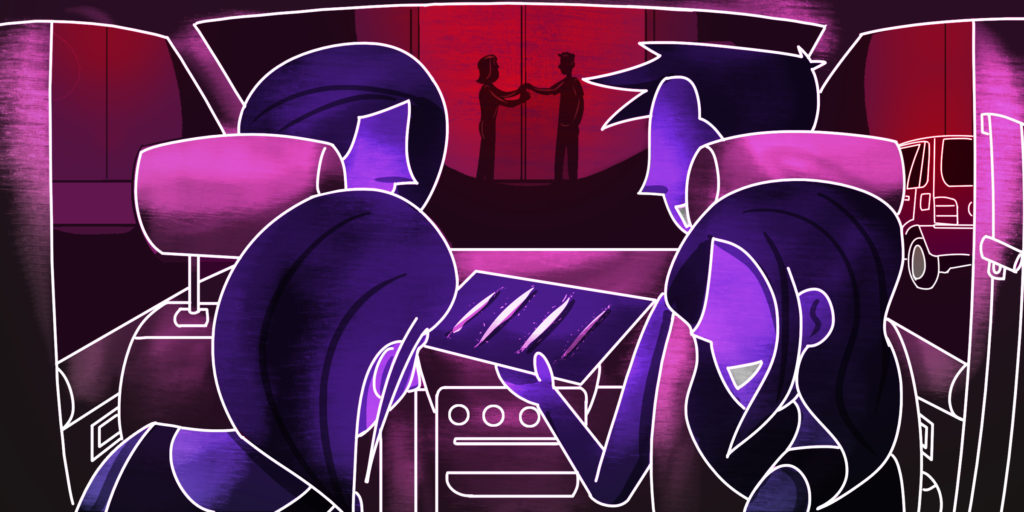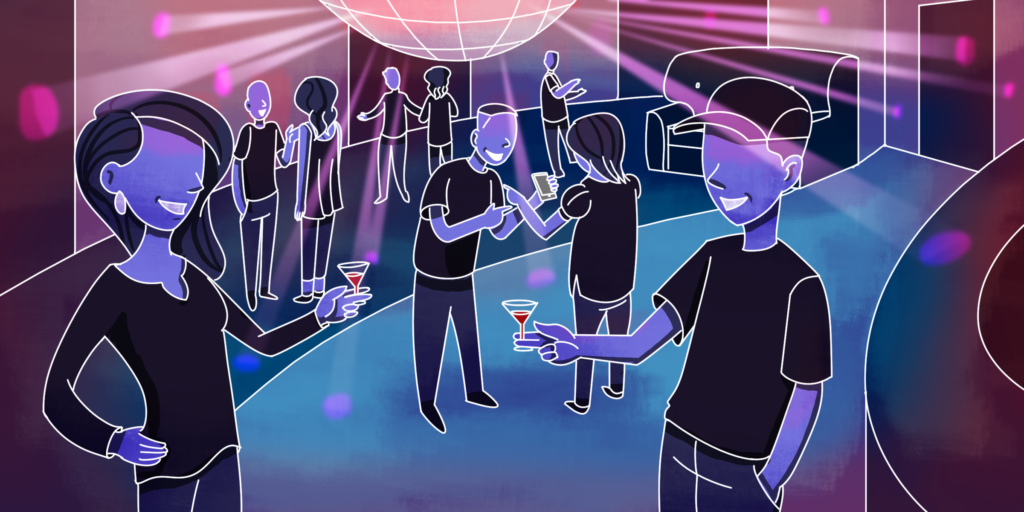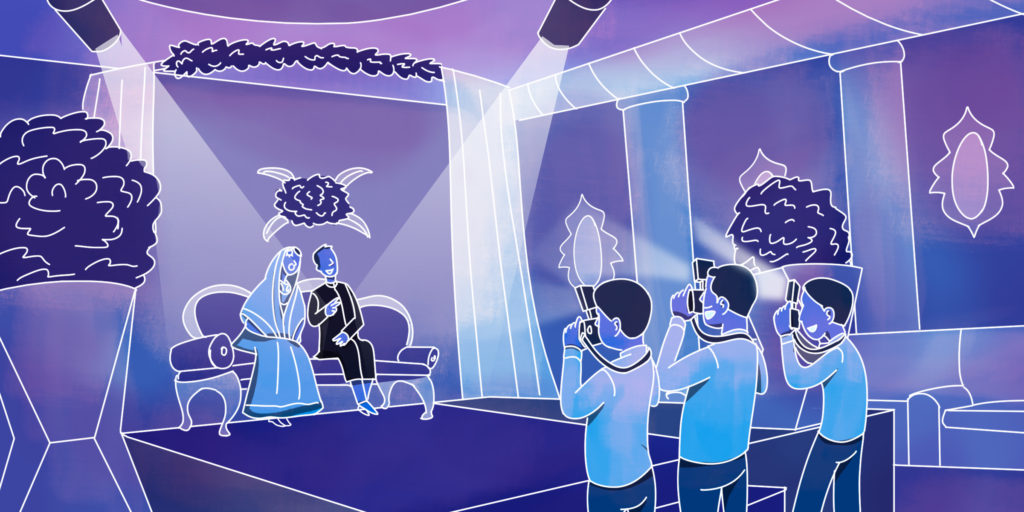Karachi, Elitistan
By Ali Bhutto | Society | Published 8 years ago

Illustrations by CFx Comics.
When Fahim wasn’t snorting lines of cocaine in the parking lot of a prestigious club in Karachi, he was busy posturing as someone who had outgrown such habits. In his twenties, the priority had been to hang out with the cool crowd and be tagged in as many Facebook photos with them as possible. Then came the phase in which frequent ‘work’ trips to Dubai were seen as indicators of career progression. But now, in his thirties, it was suddenly the season of sobriety and political correctness. The mindset driving him remained the same throughout. Central to it was a reverence of social climbing and networking within a closely-knit section of Karachi society. A lack of participation was synonymous with ‘insignificance,’ and ‘failure.’ Lesser concerns, such as personal development and the reality beneath the facade, inevitably took a back seat.
Fahim’s problems ran far deeper than dabbling in drugs on weekends. His self-esteem was hostage to popular opinion.
A few yards away from Fahim’s car, darkness punctuated by strobe lights and the sweat of hundreds filled a room of the club. It was a strange, hostile environment, fitting into which required a numbing of one’s humanity. Everyone stuck to their herd, but they had seen each other’s faces before, at a wedding. The conversations were the same: lips moved but didn’t say much because the music was too loud.
At the onset of many Ramadans, Fahim and his friends had developed the ambition of quitting drugs and alcohol — forever — and starting clean. Such revolutionary measures were necessary to get through 30 days of not being coked up or inebriated, and the hope was that this would be the new status quo. But as soon as the Eid moon was sighted, Fahim and Co. would go from holy to wholly sinners. Pretensions of purity were disposed of as swiftly as they had been deployed. All this in postcolonial clubs of Karachi, where female membership (and until recently even new furniture), is forbidden and where one must adhere to a strict dress code even to access the library.
Fahim is by no means an alumnus of the handful of schools attended by the social elite of Karachi. In their playbook, he is viewed as a ‘launda,’ but he is nevertheless, accepted as part of the status quo — a ‘goodfella’ whom everyone knows, in all likelihood presumably because he has the ‘trappings’ of many of the pillars of ‘elite’ society. And oh yes, he throws decent parties.
Fahim and some of his wider circle of friends, who had attended top schools in the city, had felt a sense of stagnation creeping in since their late twenties, but couldn’t quite place it. All they knew was that it was an underlying feeling of unease that weighed heavy in their gut. To make up for past shenanigans, they strove to exude an aura of maturity — or their definition of maturity, which normally meant fitting into what was popularly considered acceptable and decent. It required putting on an act and repressing their convictions.
The spirit of Karachi’s elite society can be found in the subtle nuances that are unable to effectively find expression in the language and sensibilities of its denizens. As a result, these influences and beliefs, deeply ingrained in many by their parents and peers, go unnoticed. They are further muted by a blaring narrative of platitudes — feminism, homosexuality, feudalism, progress, open-mindedness and freedom of speech — recycled at social gatherings and in the mainstream media. In this world of smoke and mirrors, being ‘westernised’ and being ‘progressive,’ are seen as one and the same thing.
Not everyone, however, is on the same page. Saqib, who recently moved back to Karachi with his wife, after having worked in Europe and China for several years, had always felt uncomfortable in the Karachi ‘scene.’ But living and working in the West (and in the East) raised his worth in the eyes of the elite. Now, he and his wife are the centre of attention in drawing rooms. Even their friends’ parents sit across them respectfully and slurp tea, while listening to their every word in awe.
But Saqib doesn’t care much for such a superficial environment. Just being back in Karachi is exciting enough for him. He longs for the little things that provide him with the flavour of the city, like exploring its streets, or going for a walk on Seaview — all the stuff that lies outside of the elitist bubble.
Saqib noticed that an ex-Grammarian friend of his, who was a permanent fixture on the social circuit and went out every weekend, if not every night, would get extremely upset when he wasn’t invited somewhere. That was when Saqib understood what was driving him to attend each and every party or get-together. It was the fear of feeling left out of the ‘scene’ for even a moment.
The same friend picked up Saqib and his wife one weekend. They first went to another friend’s place for a pre-party, which was still going strong at 1am, as the host had gotten into a vicious cycle of rolling and smoking joints endlessly and kept delaying departure. Finally, the three managed to break free and head to the night’s main event — a mehndi. Here, a majority of the time was spent around a ‘car-bar’ in the parking lot. As a result, Saqib and his wife weren’t able to ‘meet new people.’
Saqib was disturbed to find that women in this environment were quick to be judged and labelled by the men, using derogatory terms behind their backs, just because they had dated guys, or went to parties on weekends. Constantly reminiscing about the good old school days provided reassurance to many, but Saqib saw nostalgia as an indulgence that induced a warped view of the past, highlighting only the good times, while smoothing over the bad. Even incidents such as the time when one of their friends received a severe thrashing from an Urdu teacher in one of Karachi’s top schools, were remembered with laughter.

Industrialists, he observed, such as those who owned garment factories and were labelled by Karachi society as ‘nouveau riche,’ strove to project the impression of being ‘old money.’ They would put up photos on social media, of themselves riding horses and ‘playing polo,’ on the dirty beaches of the city. ‘Feudals,’ while blamed for the ills of the country, were ‘goodfellas’ nonetheless and a novelty at parties, in the same vein as a celebrity, or a circus animal.
While he lived away from Pakistan, Saqib had gotten into a routine of going to bed at 10pm and rising at the crack of dawn. But his friend’s day didn’t start before the sun went down. The hours prior to that were just a ‘filler,’ as was his job, which he had gotten through daddy’s connections in international humanitarian organisations.
Ahmed, also an ex-Grammarian, managed to stay in tune with his inner voice, despite the fact that he was extremely popular in the social circles of Karachi’s elite schools. After attending university in Europe, Ahmed decided to stay away from Pakistan in an attempt to avoid the cutthroat environment of Karachi society. “The prevalent fear was that I would come back and get sucked into a vortex — a lifestyle void of any awareness outside of its bubble.” That is what kept him away. “My personal apprehensions lay around the inexpensive and easy access to mind-altering substances and no shortage of avenues to perpetually be partying,” he explains. Ahmed laments that the social scene in Karachi — the biggest city in the Land of the ostensibly Pure, where the use of mind-altering substances can invite lashing and stoning — “perpetuates and promotes a lifestyle with no limits of any sort. And this never ends; it is almost a lifelong ‘sport’ for many in Karachi. The party never stops.”
Despite having spent his post-college life outside Pakistan, Ahmed found it necessary to get himself off of Facebook and Whatsapp. “It was one of the best decisions I made,” he reflects. “I feel free and independent of the ‘scene,’ wherever it may be. I feel liberated from the ‘rat race.’” Dispelling the widely held belief that Whatsapp and social media are useful tools to keep in touch with friends across the globe, Ahmed says he never once felt disconnected or detached after he had stopped using these; on the contrary, quite the opposite. “It isn’t hard to stay in touch with my friends and relationships are more meaningful now than they have been in the past.”
Then there is the other bedrock of the local social elite. Ardeshir Cowasjee coined the term ‘winter Pakistanis’ for families visiting Pakistan during the wedding season, in December and January. These include graduates from foreign universities, reluctant to move home, albeit equally reluctant to miss the party season back home. They are proof that a person can live outside Pakistan, yet still be confined to the prison of its social norms, not to mention its social events — the annual ‘balls,’ the ‘charity’ brunches, the increasingly grandiose weddings, which now see Pakistanis — from home and abroad — scurrying to get themselves appropriately rigged out for the 10-day extravaganza in Karachi, Lahore, or now, more exotic locales: destination weddings in Bali, Bangkok, Turkey, Italy, Hungary, Portugal, Spain… And the cost — sometimes up to a crore rupees for just flowers — can send one reeling. In a country with a per capita GDP of $1,629, and an average monthly household income of Rs 35,662, the extravagance is mind-boggling.
In this school of thought, most things local are trashed.
Sea View beach, or Do Darya, despite their proximity to Clifton and DHA, for example, will be avoided at all costs because they’re full of ‘locals.’ French Beach, located miles away from the city meanwhile, will be frequented since it is an exclusive retreat for the rich young and wannabe, despite the fact that its rocky topography lessens its recreational value as a beach and despite its local residents — an entire fishing village.
Going to this beach is, of course, a major production, taking up time, energy and requiring mega preparation. After all that, one would imagine that the day out would be a fun-splashed, swim, tan, volleyball-on-the-beach kind of day. Wrong. As Maria, a middle-aged woman living in Karachi noticed on a recent trip to the French Beach, “nobody actually went anywhere near the water or sand. Instead, they remained inside the hut and talked about designer clothes.”
Then there’s the safety in numbers. Going cycling, or for a walk or a jog in one’s own locality on a mere impulse, is not common. Instead, such activities are organised in groups or ‘clubs,’ in which the charm of being in a particular public space is lost due to the bubble formed by the congregation of members of a particular section of society, who are there more for the networking and small-talk than for the merits of feel-good exercise. Photos of the outing are then put up on social media to show what a great time everyone had, dressed up like they were participating in the Tour-de-France.
Class also influences the dynamics of the LGBT community. It is ‘cool’ to be gay if you’re a designer or part of the fashion scene in Pakistan. Similarly, scions of political dynasties are applauded by the elites for coming out of the closet and confirming what many already suspected. If you are a public figure from a traditional political family, being gay, or transgender, is ‘radical,’ because such a background, while giving the impression of being a giant hurdle, in fact adds value to the scenario.

If people from other sections of society were to do the same, they would not receive approval, even though it would be a far bolder move in their environment. Instead, they would either be ignored, criticised, or even lynched.
American essayist and critic, William Deresiewicz, author of Excellent Sheep, told Newsline, “People will cling to socially approved values and behaviours, no matter how shallow and even destructive they know them to be. Social acceptance is an incredibly powerful force.”
Earning acceptance in the world of Karachi’s elite is more about mindset than wealth. A gym instructor can become a ‘goodfella’ if he dresses in a particular way, is in with the right people, and uses the right catchphrases. Similarly, domestic help hired from the Philippines and Sri Lanka, is given special treatment, while locally hired help is considered ‘dirty’ and second rate.
Afiya Zia, a Karachi-based academic, observes that those among the elite who pursue careers as politicians, activists or journalists are considered “losers,” but at the same time, are partly admired for having chosen an adventurous life. This, she explains, becomes a badge in itself. Such individuals will never be invited to sports days of elite schools as chief guests, “while the most immoral and inefficient banker or corporate head will be invited to be on their board.”
Zia points out that most of Pakistan’s internationally renowned novelists currently hail from the upper classes. “They never criticise each other’s work,” she says. “There seems to be a fear of criticism and critical analysis.” Anti-colonial sentiment — another cliché — is common among Pakistan’s social elite, yet the same vocal critics enjoy the fruits of life in the West, where they either live, or spend a majority of their time.
“Groupthink,” in Pakistan, notes nuclear physicist and activist Pervez Hoodbhoy, “largely works towards increasing conservatism in society. Well-to-do women educated in English medium schools have suddenly opted for the hijab or burka. They do this because they see others like them doing it. The more you make your piety manifest, the higher you rise in the group’s esteem — and hence your own.”
“If you reject the values of the society you belong to,” explains William Deresiewicz, “you obligate yourself to discover and embrace new ones. This takes a lot of strength and courage. Most people would rather go with the flow, no matter where it’s taking them.”
Some names have been changed to protect identities.
The writer is a staffer at Newsline Magazine. His website is at: www.alibhutto.com


